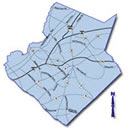The Trial
Jurors' Duties During The Trial
Do not talk to others about the case. This responsibility requires that you not talk at all with the lawyers, witnesses, or anyone else connected with the case. The lawyers understand this rule. You will find that, even at the risk of seeming rude or unfriendly, the lawyers must avoid even casual conversation with you. In order to prevent even the appearance of improper conversation, a wise policy for you to follow is to avoid any contact with the lawyers or the parties. You also cannot talk to anybody about the case. There are important reasons for this: all cases must be decided only on the evidence presented in the courtroom. If you were to discuss the facts of the case or your impressions of it with your family, friends, or any other person, you might hear their ideas and might be influenced by people who do not know all the facts. If you believe that someone has tried to speak to you about the case, you must immediately report what happened to the judge.
Do not make up your mind before hearing all the evidence. It is also your duty not to form or express an opinion about the case to anyone. This means that you keep an open mind until you have heard the evidence from all sides and the case is given to the jury for deliberation. Only then may you discuss it with your fellow jurors and even then only when all jurors are present.
Do not conduct your own investigation of the case. As a juror you must not become an amateur detective. For example, you must not visit the scene of an accident, an alleged crime, or any event or transaction involved in the case. You should not conduct experiments or consult any other person or reference for additional information. If the judge feels that an inspection of a place is necessary or will be helpful, she/he will arrange and supervise an inspection by the whole jury. If you have a question about the evidence, let the judge know by handing a note to the bailiff and the judge will make a decision about your question.
Lawyers' Opening Statements
As the trial begins, the lawyer for the plaintiff in a civil case or the prosecutor in a criminal case may make an opening statement telling you what they expect the evidence to show. The defendant's lawyer may also choose to give an opening statement after the plaintiff's attorney or prosecutor, telling you what the defense expects the evidence to show. The lawyers' statements are not evidence. Their purpose is to give you the framework of the case, the points of conflict, and the issues of the case that you will need to decide. Be careful that you do not let any of the information presented in the opening statements become evidence in your mind. Remember that the lawyers' statements are only their versions of what happened, not evidence.
Presentation of Evidence
Evidence may be presented by the attorneys in the form of a written document or an object (a gun, another weapon, a photo, an x-ray, or some other physical thing). These are called exhibits. Evidence may also include the testimony of witnesses under oath in the courtroom.
Attorney's Closing Statements
After all the evidence has been reviewed in court, lawyers for each side may present their final summary of the case, sometimes referred to as an argument. The lawyers can talk about reasons and make conclusions, but these are not evidence. You should listen to these statements carefully and consider them thoughtfully, but you must form your own opinion about the outcome of the case.





